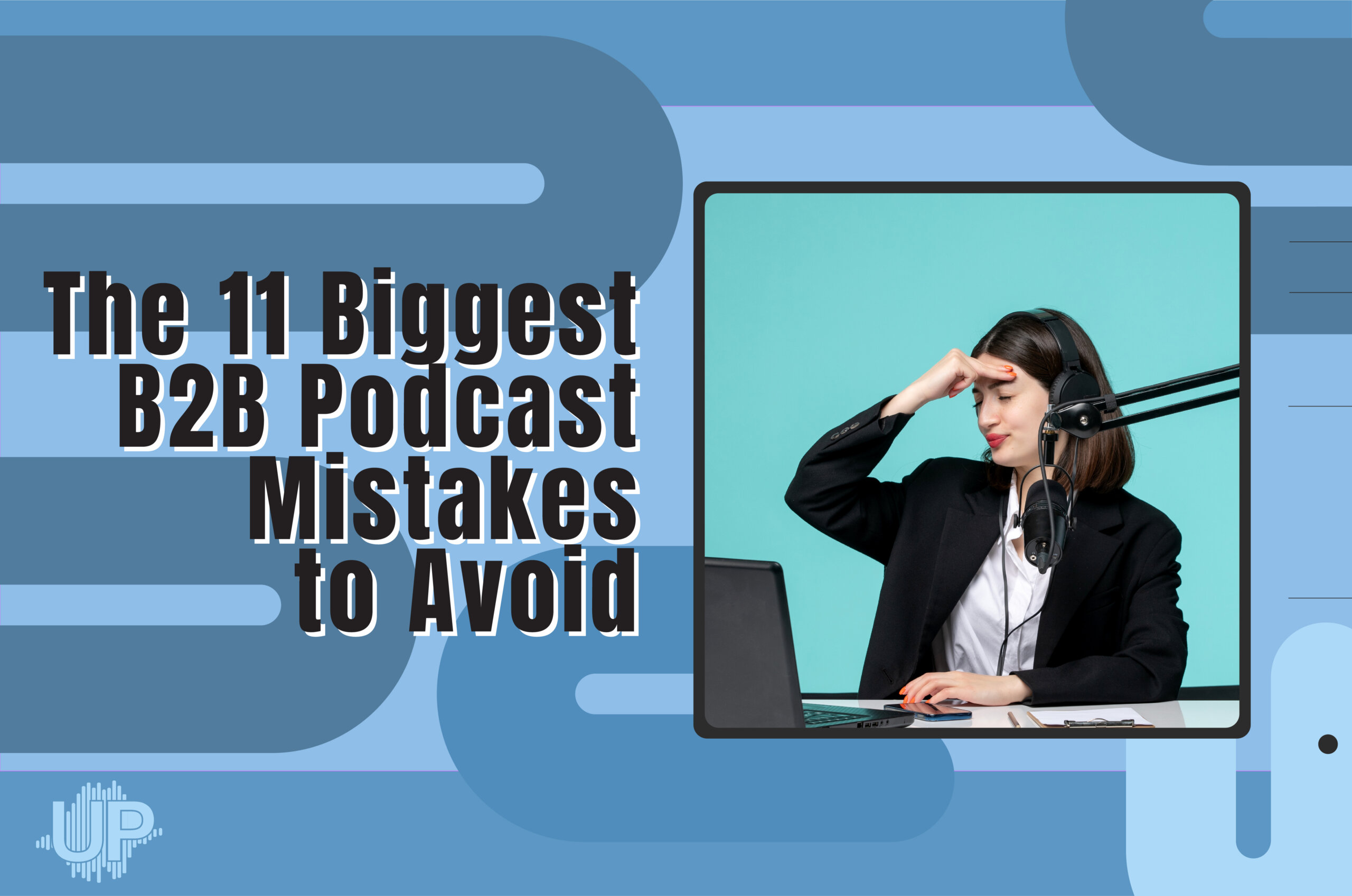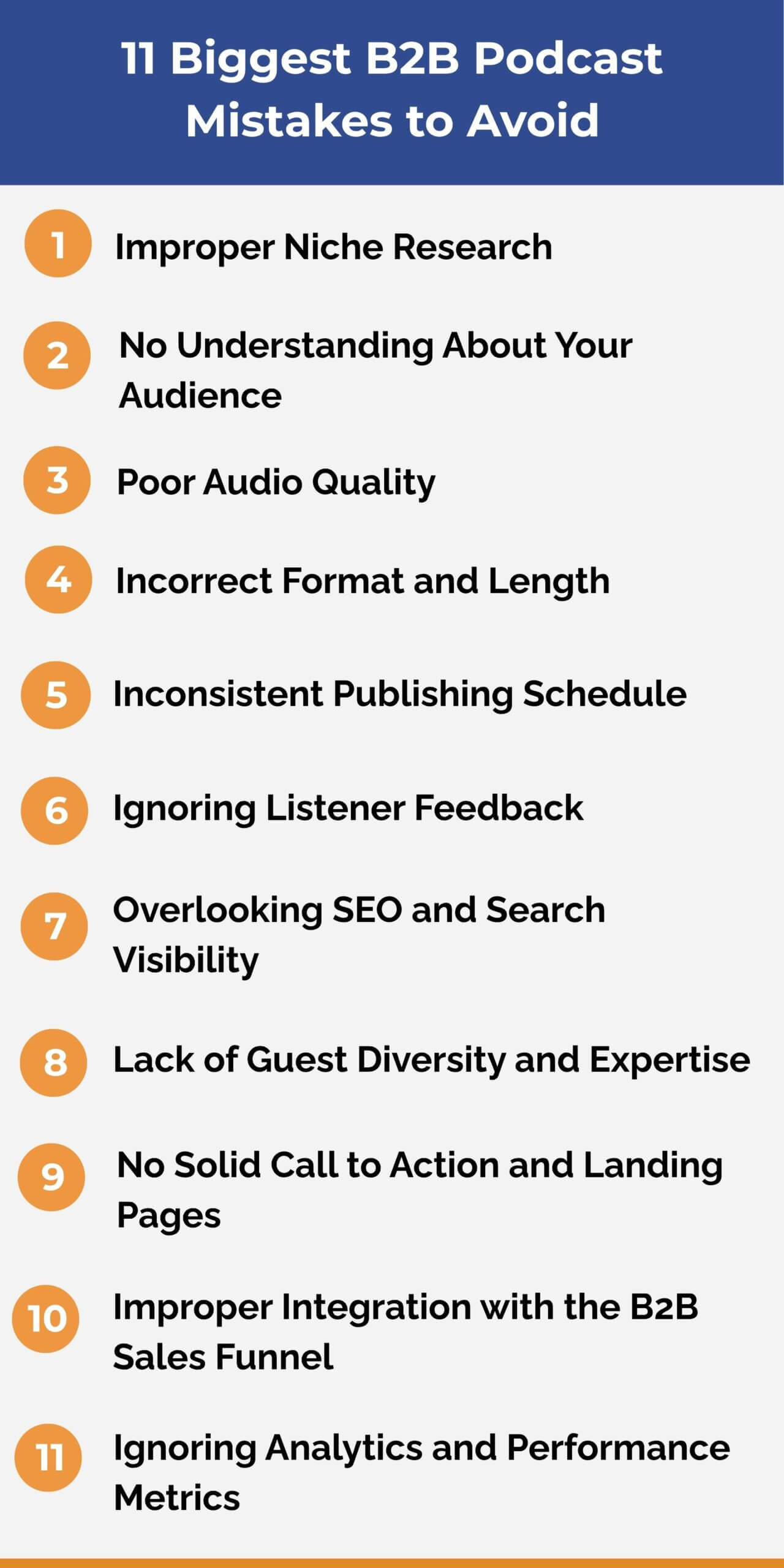
Podcasts are a vital tool in B2B marketing for boosting visibility and building strategic relationships. However, many podcasters fall into common pitfalls that can limit their podcast's effectiveness. This article outlines the 11 biggest B2B podcast mistakes to avoid. From poor niche and audience understanding to ignoring key analytics, recognizing these errors can help you enhance your podcast's impact and reach your business goals. Let’s explore these critical mistakes and learn how to avoid them.
Table of Content
- Improper Niche Research
- No Understanding About Your Audience
- Poor Audio Quality
- Incorrect Format and Length
- Inconsistent Publishing Schedule
- Ignoring Listener Feedback
- Overlooking SEO and Search Visibility
- Lack of Guest Diversity and Expertise
- No Solid Call to Action and Landing Pages
- Improper Integration with the B2B Sales Funnel
- Ignoring Analytics and Performance Metrics
Improper Niche Research
Choosing the right niche is crucial for a B2B podcast because it determines the relevance and appeal of your content to your target audience. A common B2B podcast mistake is selecting a niche that is either too broad or not sufficiently aligned with your expertise and business goals. This misalignment can result in content that fails to engage the intended listeners or to establish your authority in the field.
To avoid this pitfall, conduct thorough market research to identify gaps in the existing B2B podcast landscape where your expertise can shine. Understand the specific interests and challenges of your target audience, and tailor your podcast’s focus to meet these needs. This strategic approach ensures your podcast not only attracts but also retains a dedicated listener base that values your unique insights and perspectives.
No Understanding About Your Audience
Understanding your audience is foundational to the success of any B2B podcast. Without a clear grasp of who your listeners are, what they care about, and what they seek from your content, you risk producing episodes that don't resonate or provide value. This disconnect can lead to low engagement and high attrition rates among listeners.
To effectively address this issue, invest time in audience analysis. Utilize surveys, listener feedback, and engagement metrics from your podcast platform to gain insights into your audience’s demographics, professional roles, and industry challenges. This data will help you craft content that speaks directly to their interests and needs, thereby enhancing listener loyalty and engagement.
Poor Audio Quality
Audio quality is critical in podcasting. Poor sound can deter listeners from engaging with your content, no matter how valuable the information might be. Common audio issues include background noise, uneven sound levels, and low-quality recording equipment, all of which can lead to a frustrating listening experience.
To ensure high audio quality, invest in good microphones and sound editing software. Record in a quiet environment and consider professional help for mixing and mastering if your budget allows. Regularly test your equipment before recording to avoid any unpleasant surprises in your published episodes. By prioritizing clear and crisp sound, you make your podcast more professional and enjoyable for your audience.
Incorrect Format and Length
Choosing the wrong format or length for your episodes can alienate listeners and reduce engagement. While there's no one-size-fits-all solution, episodes that are too long or too short for the content type or audience expectation can hinder the effectiveness of your podcast.
Determine the ideal episode length and format by considering your topic's complexity and your audience’s listening habits. For instance, deep dives into technical subjects may warrant longer episodes, while updates or news segments might be best kept short. Experiment with different formats and lengths in your initial episodes and monitor audience feedback to find what works best for your listeners. This adaptability ensures your podcast remains engaging and accessible.
Inconsistent Publishing Schedule
Consistency is key to building and maintaining an audience for your B2B podcast. An erratic publishing schedule can confuse listeners and erode trust, making it difficult for them to incorporate your podcast into their regular routine.
To avoid this B2B podcast mistake, establish and adhere to a regular publishing schedule, whether it's weekly, bi-weekly, or monthly. Plan your content in advance and consider batching recordings to ensure you always have episodes ready to go, even during busy periods. Communicating any changes in your schedule ahead of time through your podcast's channels can also help manage listener expectations and maintain engagement.
Ignoring Listener Feedback
Feedback from listeners is invaluable for improving your B2B podcast and ensuring it remains aligned with audience needs and preferences. Ignoring this feedback can lead to stagnant content that fails to evolve with your audience, ultimately decreasing listener engagement and satisfaction.
To leverage listener feedback effectively, actively solicit it through social media, email, and directly in your episodes. Make it easy for listeners to provide their thoughts and show that you value their input by acknowledging and, where appropriate, implementing their suggestions. This not only improves your B2B podcast but also fosters a stronger connection with your audience, encouraging loyalty and long-term engagement.
Overlooking SEO and Search Visibility
SEO (Search Engine Optimization) is often overlooked by podcasters, yet it's crucial for increasing the visibility of your B2B podcast. Without it, you miss out on potential organic search traffic that could elevate your listener base.
To optimize your podcast for search engines, include relevant keywords in your episode titles, descriptions, and transcripts. This practice improves the likelihood that your B2B podcast will appear in search results related to your niche. Additionally, consider creating a website or blog for your podcast where you can post episode transcripts, show notes, and related content, all of which enhance your SEO efforts. These strategies help new listeners discover your podcast through search engines, broadening your audience.
Lack of Guest Diversity and Expertise
Featuring a diverse range of guests with varying expertise can greatly enrich your B2B podcast, offering fresh perspectives and knowledge that appeal to a wider audience. A common B2B podcast mistake is having a homogenous group of guests, which can limit the appeal and relevance of your content.
To avoid this, actively seek out guests from different backgrounds, industries, and levels of expertise. This diversity not only enhances the content quality but also broadens your podcast’s appeal, attracting listeners from various sectors. Ensure that each guest brings something unique to the table, whether it’s niche expertise or a novel perspective on common challenges. This approach keeps your content dynamic and engaging.
No Solid Call to Action and Landing Pages
A clear call to action (CTA) is essential for converting podcast listeners into active participants or customers. Without effective CTAs and dedicated landing pages, you miss opportunities to deepen engagement or drive business outcomes.
Ensure that each episode includes a compelling CTA, guiding listeners on what to do next—whether that's visiting a website, signing up for a newsletter, or following your podcast on social media. Pair these CTAs with well-designed landing pages that provide additional value and are tailored to the episode's content. This strategic alignment not only enhances user experience but also increases the likelihood of converting listeners into leads or customers.
Improper Integration with the B2B Sales Funnel
Integrating your podcast into your B2B sales funnel is critical for maximizing its business impact. Neglecting this integration can result in missed opportunities for nurturing leads and driving conversions.To effectively incorporate your podcast into your sales funnel, align your content with the different stages of the buyer’s journey.
Use episodes to address common questions or challenges at each stage, from awareness to consideration to decision. Provide resources and links that guide listeners to relevant content or landing pages that can help move them further down the funnel. This thoughtful integration not only enhances the listener experience but also supports your overall business objectives, turning your podcast into a powerful tool for lead generation and customer engagement.
Ignoring Analytics and Performance Metrics
Analytics and performance metrics are crucial for understanding the impact of your B2B podcast and guiding its development. Ignoring these metrics can lead to uninformed decisions and missed opportunities for improvement.To fully leverage analytics, track key performance indicators (KPIs) such as listener numbers, episode downloads, engagement rates, and listener demographics.
Use this data to identify what resonates with your audience and where there may be room for enhancement. Adjust your content strategy based on these insights to optimize listener engagement and retention. Regularly reviewing these metrics will help you refine your podcast’s approach and ensure it continues to meet the evolving needs of your audience.
Listen to the Thoughtful Entrepreneur
More Resources from UpMyInfluence:
How to Be An Exceptional Podcast Host


